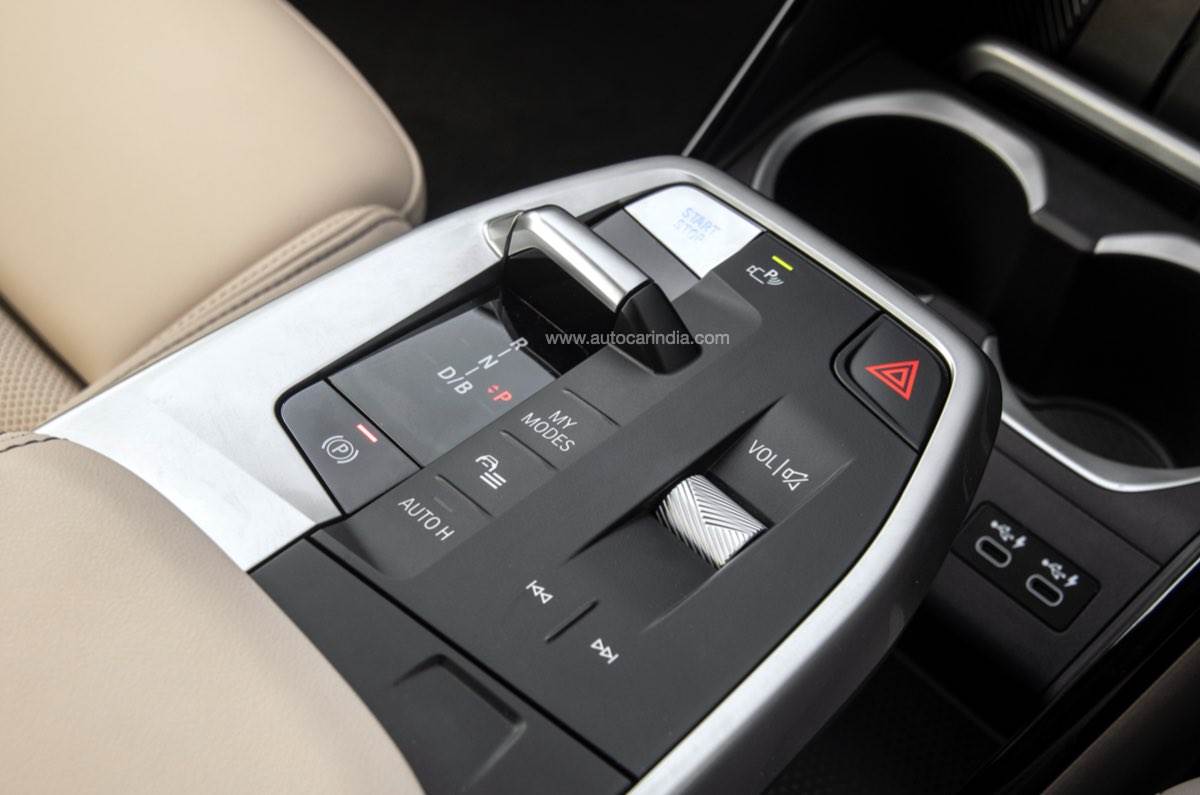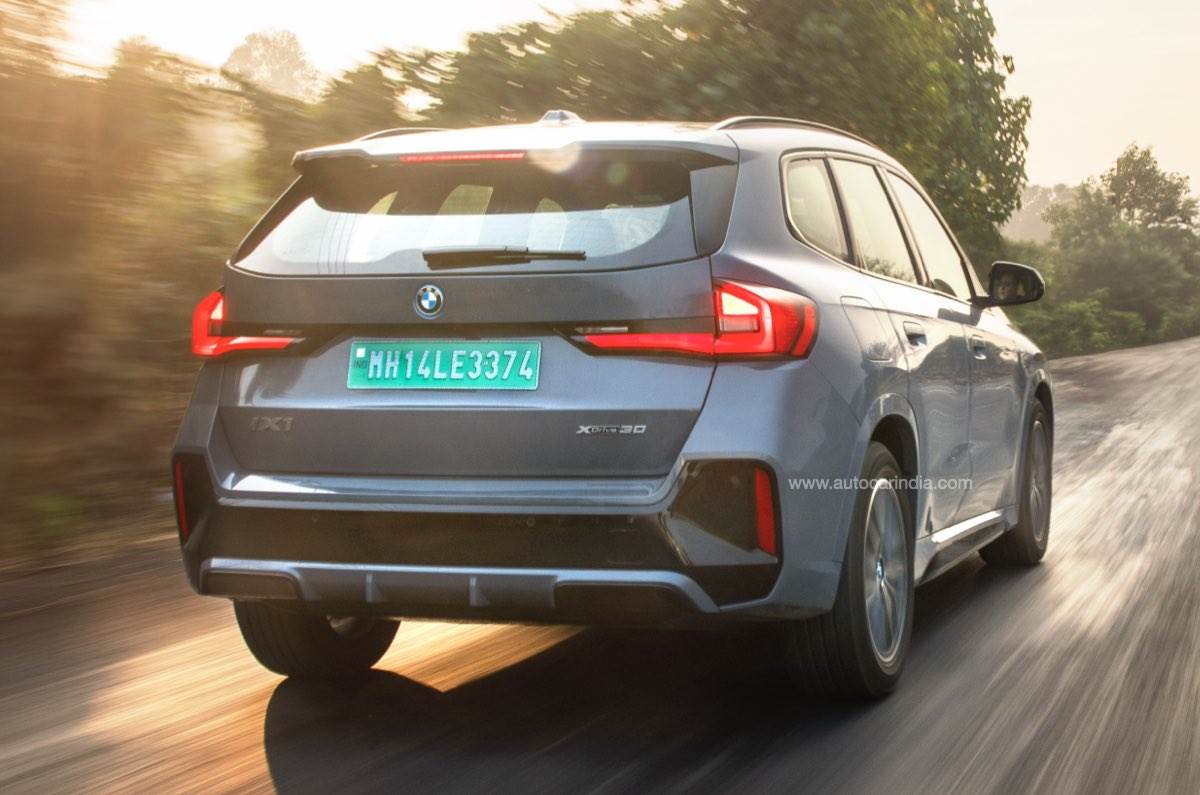With powerful twin electric motors and loads of performance, the EV version of the X1 promises much.
BMW’s X1 comes with a 123hp petrol, a 150hp diesel and this, the all-electric iX1 with 313hp. Welcome to the brave new world, where petrol-powered cars have to be emaciated and choked to meet individual and corporate emissions norms, and electrics run amok and deliver loads and loads of power and performance.
That the iX1 makes more than twice the power of the diesel is quite an eye-opener, and then there’s the little matter of performance – BMW claims it can use its twin e-motors to deliver a claimed 0-100kph time of just 5.6 seconds. Wow. So what’s the X1 with an electric powertrain and a few other changes like to drive and ride in?
BMW iX1 performance, ride and handling
First up, ‘Efficiency’ mode. What’s nice is that even in this mode, take-off from rest is smooth, there’s a linear build up of torque, and what makes it feel even more useable is that the accelerator pedal is acceptably responsive. The iX1 also works well for those who like to drive naturally with a low level of regeneration, the electric system here mimicking the drag of a combustion engine pretty well. Also adding to the experience is that the cabin is well insulated, with only a small amount of road noise filtering in. What is a bit galling is that to adjust regeneration levels, you have to go into a menu on the touchscreen.
Want to get off the line in a sportier manner, or whip past cars when overtaking? You need to shift to Sport mode. Performance here is just thrilling. With one motor over each axle and almost 500Nm of torque, the iX1’s best party trick involves an explosive launch off the line, left paddle pulled to engage E-boost mode for 10 seconds. This delivers all 313hp to the four wheels and the electric X1 charges forward with a solid push in the back. It initially feels more rapid than the claimed 0-100kph time of 5.6 seconds suggests, and while performance tapers off as you go faster, this still is a lot of fun. Also what’s fun is overtaking slower traffic in Sport, the instant surge of power helping you fly by in a snap. That said, Volvo’s XC40 Recharge with a claimed 0-100 time of 4.9 seconds is quicker still.
Thanks to the twin motor four-wheel-drive setup, the iX1 also has no problem in putting its power down, even sending more power to the rear axle as you exit corners. While it doesn’t have the traditional rear-wheel-drive BMW balance or the crispness or the sheer verve of the more expensive and bigger iX EV, it still has enough grip in corners to entertain.
Wish the steering were better though. It is lacking in feel and a bit inconsistent when loaded up in corners, and that means it doesn’t deliver much confidence. And while grip levels are alright, the iX1 rolls when you go faster in corners, the suspension struggling to contend with the two-tonne body weight. And that’s despite this car having adaptive dampers. Also not quite up to what you expect from a BMW is brake feel, the initial bite that imbibes confidence is missing, though things get better as you brake harder.
When it comes to comfort, the ride at low and medium speeds over regular bumps is quite absorbent. What this means is that in an urban setting, the iX1 feels at home and is comfortable. Go quicker, however, especially on a less than perfectly surfaced road, and the iX1’s suspension gets reactive and busy, even tossing occupants around over really bad patches.
BMW iX1 battery, charging and real-world range
To transform the ICE X1 into the electric iX1, out go the engine, gearbox, radiator and fuel tank, and in their place come e-motors, an inverter, controller, a DC converter, an onboard charger and a large battery. There’s no frunk or front boot on the iX1, odd for an ICE to EV conversion with such a large bonnet. And since there’s an e-motor on the rear axle together with accompanying power electronics and transmission, the 490-litre boot has no space cut into its floor for a spare tyre. BMW India has provided a spare in a Rexine cover but this eats into the luggage space.
Between the axles sits the 64.7kWh battery and the floor of the X1 is raised to make room for it. When tested, the iX1 registered a real-world range of 323km in mixed conditions. BMW says an 11kW AC charger can manage a 0-100 percent charge in 6.5 hours. DC fast charging can be done at up to 130kW, with a 10-80 percent charge taking around half an hour.

There’s no space for a spare under the floor due to the rear e-motor and battery.
The battery can also be manually pre-conditioned for a quick DC charge, with the step down in charging speed as the battery nears full charge now done in a linear instead of a stepped manner. Also used here are alternate on/off cooling cycles, to keep the battery at just the right temperature when under load. And use the same fast charger twice and the iX1 will remember what settings and pre-conditioning to use.
To improve aero efficiency and refinement, the battery and drive units are encapsulated, and BMW has also soundproofed the AC refrigerant compressor, which on a silent electric car can sound quite loud. The iX1 also comes with Automated Level 2 driving as designated by the SAE (Society of Automotive Engineers). The camera and radar-based system includes a steering and lane control assistant and an Active Cruise Control that slows the car down for traffic spotted ahead. \

Performance is thrilling in sports mode.
The electric motors on the iX1, like on most BMWs, don’t use permanent magnets. Apart from being green, this also reduces the ‘drag’ from the permanent magnet’s field, and allows the car to freewheel at a lower level of resistance. The motors used are uniquely also not brushless. BMW, however, says the sealed and airtight units are unlikely to need a service due to dust contamination. These motors, in this form, can push out a maximum of 190hp each, with a max of 50kW generated when you lift off the accelerator and 120kW when you brake.
BMW iX1 interior, features
Based on the X1, the cabin of the iX1 is superbly built and put together. The quality of the materials in general is top class and easily better than most rivals. In addition, the design is fresh and the overall ambience inside is so good, this doesn’t feel like an entry-level BMW. Even the sportier M seats are large and comfy and offer a massaging function.

High-quality bits abound on the beautifully crafted and designed cabin.
It’s not without its oddities and niggles. There are no cooled seats, the elbow box opens the wrong way for the driver, and to adjust driver modes or the aircon, you need to go two menus deep on the touchscreen. Still what makes the iX1 feel special is that it is well-insulated and quiet and comes with clever features like the stand-up charging pad and an electronic assistant that will even reverse for you.
Where the iX1 cabin differs from the X1 is rear seat comfort. While the seat is fundamentally the same and comfortable in isolation, you can’t slide the bench back for additional legroom (as you can on the X1) due to the placement of the rear electric motor. And on this electric version, you are sat closer to the floor with a knees-up position, as the big battery eats into the cabin space. You can recline the backrest, which adds marginally to comfort, but this has to be done by tugging on small nylon hoops.

Seat is relatively low; limited legroom at rear, but backrest reclines.
When it comes to features, the iX1 gets massaging seats up front, a large panoramic sunroof, Apple CarPlay, automatic headlight range control, mood lighting front and rear, 40:20:40 folding rear backrest, kick-enabled tailgate, connected tech, smartphone-enabled key, real-time navigation, front collision warning with brake intervention, evasion assist, cornering brake control and tyre pressure monitoring. You also get 24×7 roadside assistance for 5 years and an 8-year/1,60,000km warranty on the battery.
BMW iX1 price, verdict
The iX1 retails for Rs 66.9 lakh, roughly Rs 20 lakh more than the diesel X1, or Rs 10 lakh more than electric rivals like the Volvo XC40 recharge. The rear seat isn’t as comfortable as the combustion engine X1 and it doesn’t quite attack corners with the same agility and verve we’ve come to expect of BMWs.

Easily is the most fun X1 of the range.
However BMW’s all-electric iX1 delivers something no ICE X1 can – plenty of power and performance. This easily makes it the most fun X1 of the range, clearly something potential owners will be able to relate to. The twin-motor EV also delivers a real-world range of 323km, as tested on the Autocar EV test route, and then what the upmarket cabin manages to easily deliver is a proper luxury car experience. So if strong performance and an upmarket cabin are important and you are willing to stretch your budget, the iX1 could be a compelling alternative.
Also see:

























